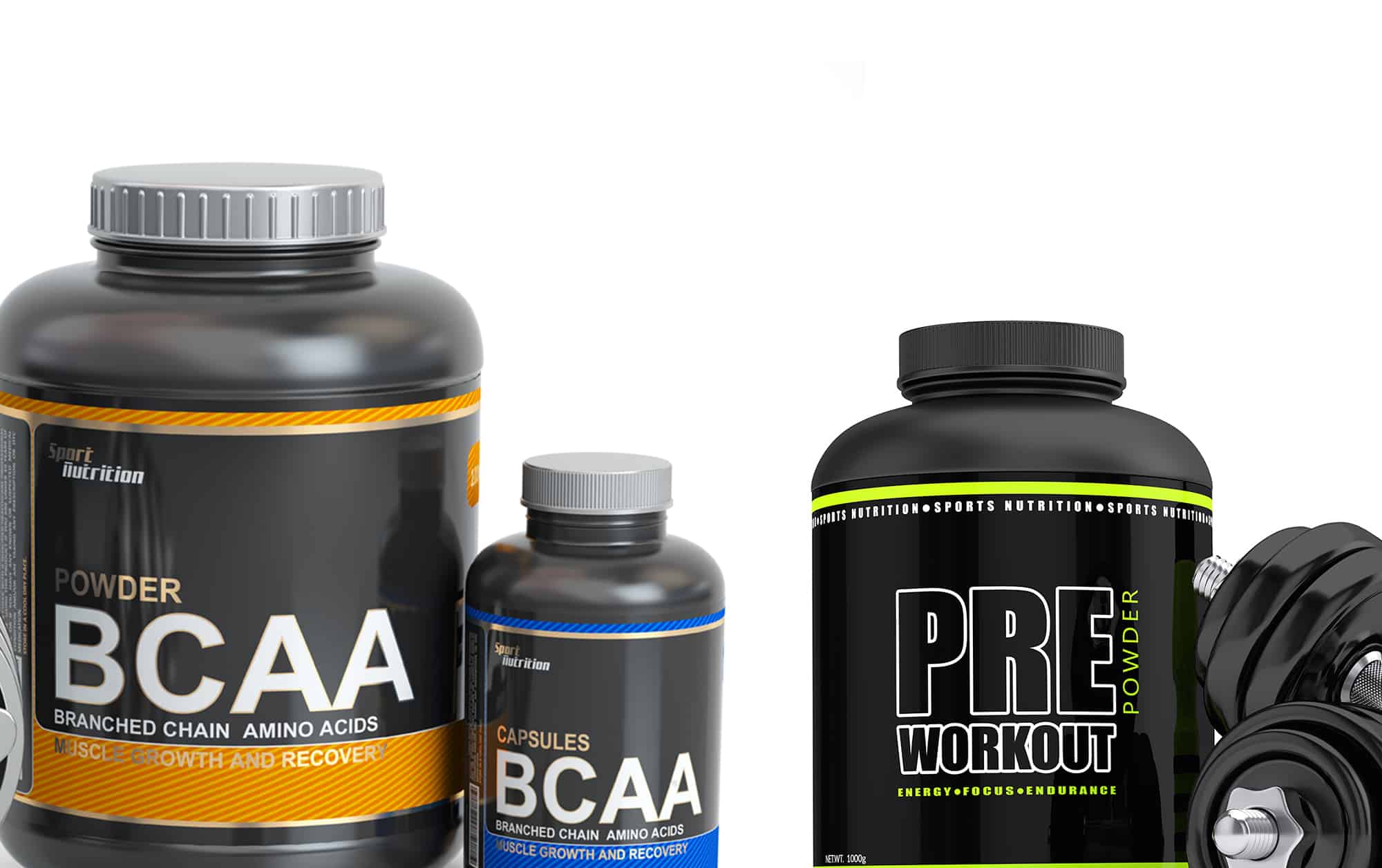One is a group of essential amino acids, and the other one is a mixture of different ingredients that have been found to have a positive effect on your body during exercise.
What are BCAAs and can they give you the same benefits and an increase in muscle growth as pre-workouts?
Should you be mixing your BCAAs drink with your other supplements and are there any safety issues connected with it?
These and many more questions will be answered in the article that follows.
BCAA vs Pre Workout
Tale as old as time (well kind of). Pre-workout supplements or Branched-Chain Amino Acids (BCAAs)? Which is the one that gives you the best increase in performance at the gym?
In most pre-workout supplements BCAAs are a common ingredient. So the question you should be asking is: Is taking only BCAA enough, to help me with my gym performance?
To answer that question, first, we need to take a look at what BCCA actually is.
What Is BCAA?
BCAAs or Branched-Chain Amino Acids are considered to be essential amino acids [1]. What does that entail? Simply put, your body needs those acids in order to function properly. Without them, you would probably die (scary, right?).
But, don’t you worry, BCAAs are found in most foods that we eat, so if you are not starving you should not have to worry about this. And if you are starving, then these acids are not in the list of your top priorities.
This group of acids consists of three amino acids: leucine, isoleucine and valine.
1. Benefits
Taking BCAAs before a workout can increase your muscle growth (leucine is the one responsible for that). They are considered to be a building block for protein and muscle.
Now, what is muscle without energy (well it’s still muscle)?
For an increase in energy and regulating your blood sugar levels, isoleucine and valine play an important role [2].
BCAAs can also help reduce fatigue by limiting the production of serotonin in your brain.
2. Recommended Dosage
For women, the recommended dosage is between 3 and 5 grams per day. Assuming of course, that your workout schedule is normal (what is normal?).
If you are into crossfit and higher workloads you could take up to 12 gr a day (not in one serving, but throughout your day).
Men can take up to 20 grams a day, again, depending on your workload. It’s important to note that one serving should not exceed 10 grams.
3. When Should You Take It?
The best time to take BCAA is close to your workout. If you want to prevent muscle breakdown (and why shouldn’t you?) and to increase muscle recovery you should take BCAA after your workout, as well.
Just, be mindful not to exceed the recommended dose.
4. Side Effects
As far as side effects go, BCAAs are mostly harmless when used as a pre-workout supplement. Most problems with it are caused by excessive use and people not following the recommended dosage.
What are those problems? Fatigue, headaches, loss of coordination, nausea and in some rare cases, increased resistance to insulin (this one is connected with type 2 diabetes) [3].
What Is Pre Workout?
Pre-workout refers to a type of supplement used before a workout to give you an increase in energy, strength, endurance etc. The most common ingredients used are caffeine, creatine, L-arginine, beta-alanine and (you’ve guessed it) BCAAs.
1. Benefits
There are a lot of benefits connected with using pre-workout supplements.
Pre-workouts can help increase muscle growth, reduce fatigue, increase your energy and overall performance at the gym [4].
Using these supplements can help your body recover faster and give you that edge during long training sessions.
2. Recommended Dosage
It all depends on the brand of pre-workout supplements that you are using. Read the label and be mindful of the ingredients.
For beginners, it’s recommended to take only one serving of pre-workouts. How much is one serving, you might ask? It’s usually one scoop of powder (don’t worry you will get the scooping apparatus with your supplement).
3. When Should You Take It?
Most ingredients in your pre-workouts have a certain period of time before they reach the optimal level in your bloodstream. For most of those ingredients, that time varies between 30 to 60 minutes.
So, to get the best result, you should take your pre-workouts at least half an hour before going to the gym. Don’t drink them at the gym! Give those ingredients time to react with your body, in the way that it’s intended.
4. Side Effects
Because of the many ingredients, side effects of pre-workout supplements may vary. Again, most healthy people who don’t exceed the recommended dose will be absolutely fine.
Potential side effects include diarrhea, increased blood pressure, insomnia, heart palpitations, tingling sensation in your skin, and, unfortunately much more [5].
Can You Take BCAA and Pre Workout Together?
Well, you can, technically. There are a lot of people who take pre-workouts before exercise, and then after when they are finished, in order to help their body recover, they add BCAA in their post-workout shake.
In most pre-workouts BCAAs are already included, so if you want to mess around with adding it yourself you should check the label of the product that you are using to make sure you don’t take too much of it.
Which Is Better BCAA or Pre Workout?
Answering this question is rather difficult because most of the pre-workouts contain BCAA as an active ingredient. It all depends on your possible sensitivity to other ingredients in pre-workouts.
For example, if you are oversensitive to caffeine, you should avoid supplements that have it. In that case, BCAAs are the thing for you.
If you are not sensitive to anything (like Jason Statham) you should take any type of supplement you want, before going to the gym.
The Bottom Line
Using supplements can help your performance at the gym. Whether or not those supplements contain BCAAs it’s completely up to you.
Taking them can increase muscle growth, your strength and energy output during your exercise.
When using BCAA supplements it’s important not to go over the recommended dose.
References
1. https://www.ncbi.nlm.nih.gov/pmc/articles/PMC5568273/
2. https://pubmed.ncbi.nlm.nih.gov/21297567/
3. https://www.ncbi.nlm.nih.gov/pmc/articles/PMC6212987/
4. https://jissn.biomedcentral.com/articles/10.1186/s12970-018-0247-6
5. https://pubmed.ncbi.nlm.nih.gov/30089501/






